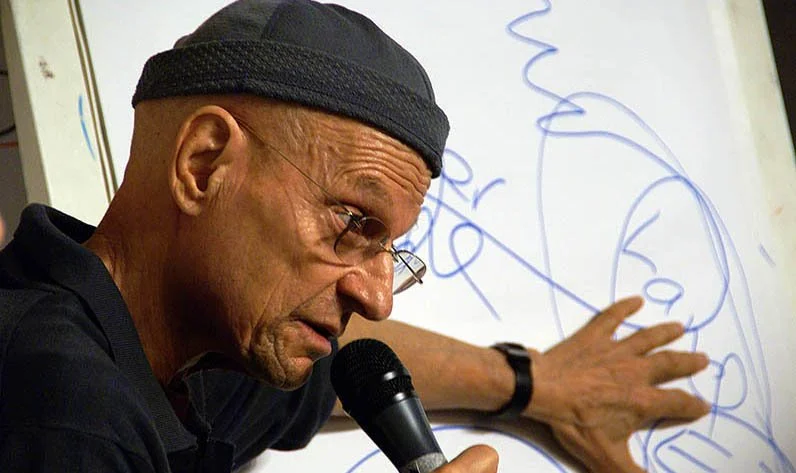The man who placed process at the heart of groupwork
Arnold Mindell
Psychologist, therapist, group worker, author
1 January 1940 – 10 June 2024
A tribute by Jim Buckell and Gini Gough
Facilitators the world over have drawn on the groundbreaking work of a giant in the field of psychology, Arny Mindell, who died at the age of 84 last month.
Many of our Groupwork Centre participants would have heard us refer to Mindell’s concept of “sitting in the fire”, the title of one of his 23 books, which has informed and shaped our ability as facilitators to sit in “hot spots”, to work with unconscious group dynamics and to navigate power and conflict.
Arny’s work has helped us to see that when we sit in the fire together, when people can express strong emotion and be deeply heard, we can find meaning, compassion and new ways forward together arriving at productive and often transformational outcomes. You’ll often hear us say, “It’s where the gold is.”
Arny taught us that in order to sit in the fire, as facilitators, our daily practice is to continually develop our own self-awareness, our understanding of ourselves in groups, building our own emotional resilience. Glen Ochre, our co-founder, who was inspired by Arny’s work, would always say to us “First facilitate thyself”.
“Before we can transform communities with conflict, we have to be able to survive it ourselves. A special kind of innerwork is needed to transform us into elders who can sit in the fires. Without such transformation we will continue to repress our awareness of group tensions and thereby perpetuate the world’s troubles,” – Arny Mindel, Sitting in the Fire, p33
Arnold Mindel developed process work, or process-oriented psychology, as a way of working in helpful ways with the often chaotic internal dialogue of individuals and the equally messy dynamics of groups.
Born in upstate New York, Mindell began his academic life as a physicist, and although fascinated by quantum physics, he lamented, “there were no people involved”. So he switched fields and studied psychology at the Jung Institute in Zurich Switzerland.
After working as a therapist for a few years, he yearned for a deeper understanding of the connection between illness and the psyche and began to explore the bodily manifestations of dreams. His concept of the “dreambody” extended the reach of Jungian psychology.
Ever restless and inventive, Mindell began to turn his attention to broader horizons: the troubled world, intercultural conflict, organisational psychology and group dynamics. This curiosity led to his development of process work, which has had a deep influence on the work of facilitators and group workers. The intercultural aspect of this he called Worldwork.
Process work stems from the understanding that the subconscious and unconscious inform our thoughts and actions alongside the mundane reality of the everyday world we inhabit consciously. In this way, it echoes the understanding of traditional societies and First Nations peoples, for whom the spirit world, “the Dreaming”, is a revered source of wisdom.
Process work does not erect boundaries around these different modalities, but allows them to unfold in their own way.
As a group worker, Mindell understood that human connections and interactions create energy, or flow, and we must understand this energy field in all of its forms in order to reach outcomes that benefit all of those involved.
The process of moving through challenges, significant differences and strong emotions is transformative. As facilitators and group workers this has practical applications.
We sit with hot spots in groups in order to allow the emotions an outlet. When the fire begins to die down, groups naturally move towards constructive resolution of their issues. If we can harness this energy and help the group focus on the details of how to best resolve their challenges, we can truly be of service.
Mindell, often working in collaboration with his lifetime partner Amy, with whom he established the Process Work Institute in Portland Oregon, built on the psychological insights of Freud and Jung in a way that opened up the field of psychology from the individual to groups.
As facilitators we cannot overestimate his contribution to the understanding of the human condition that underpins our work.

